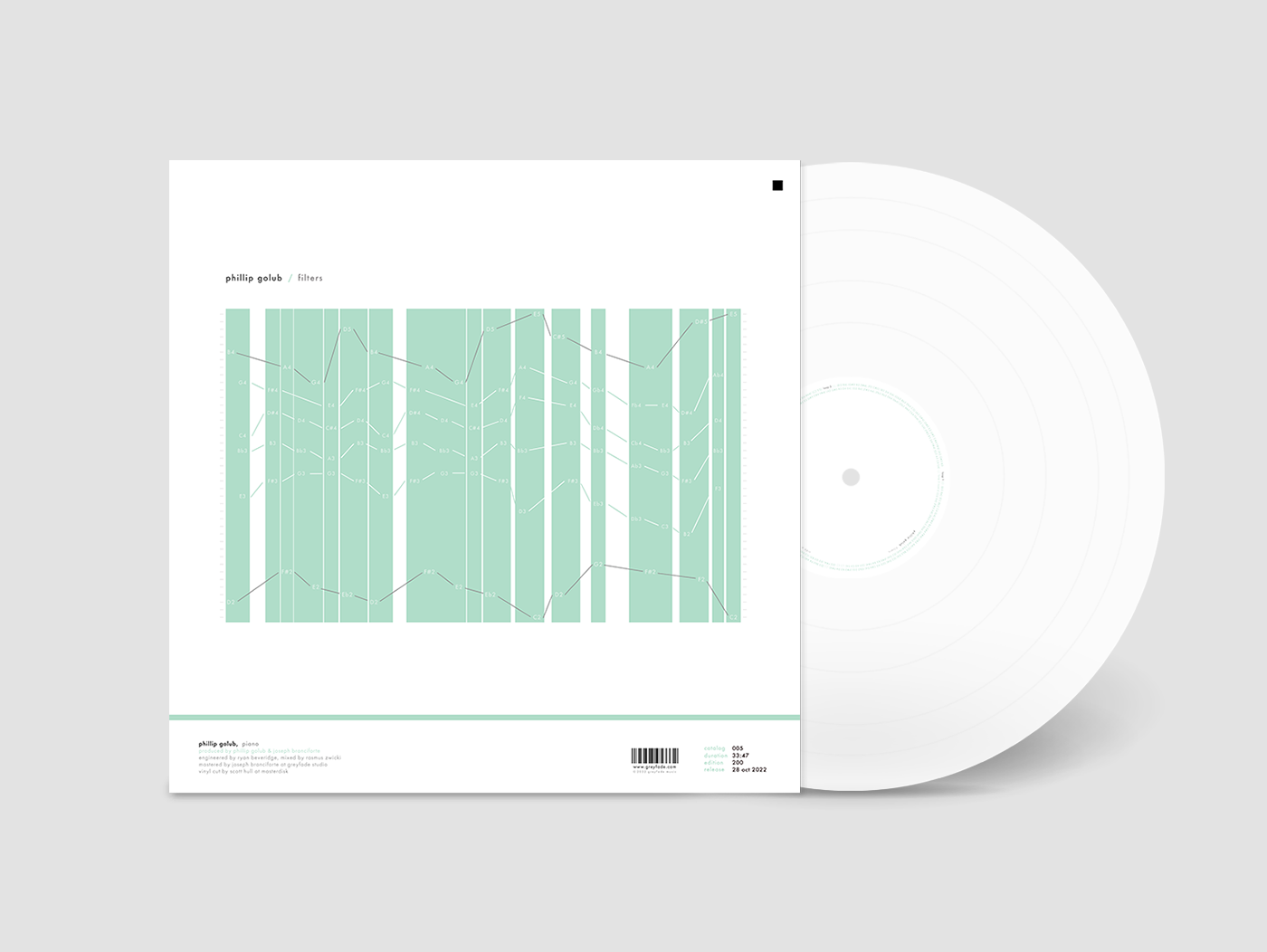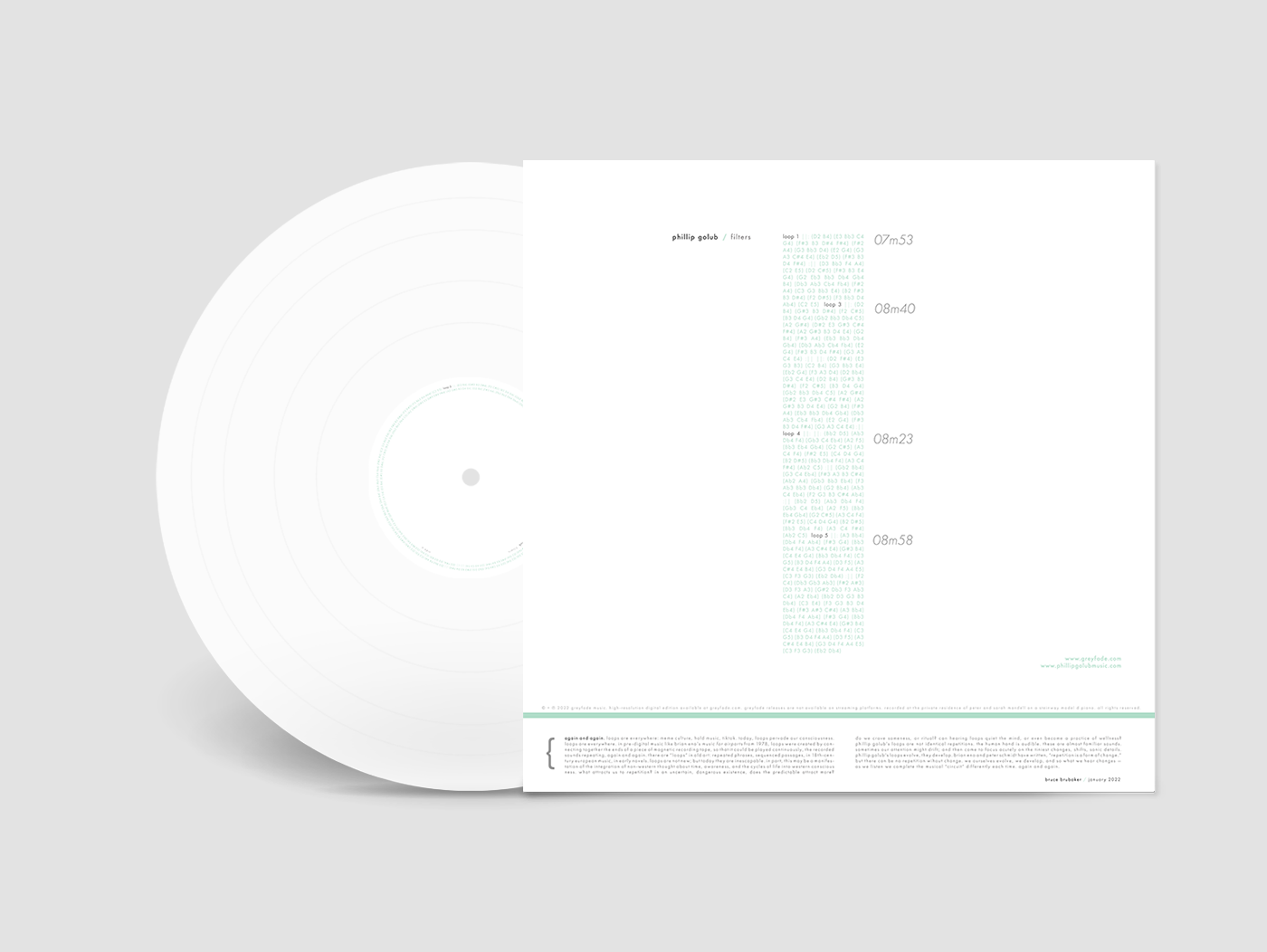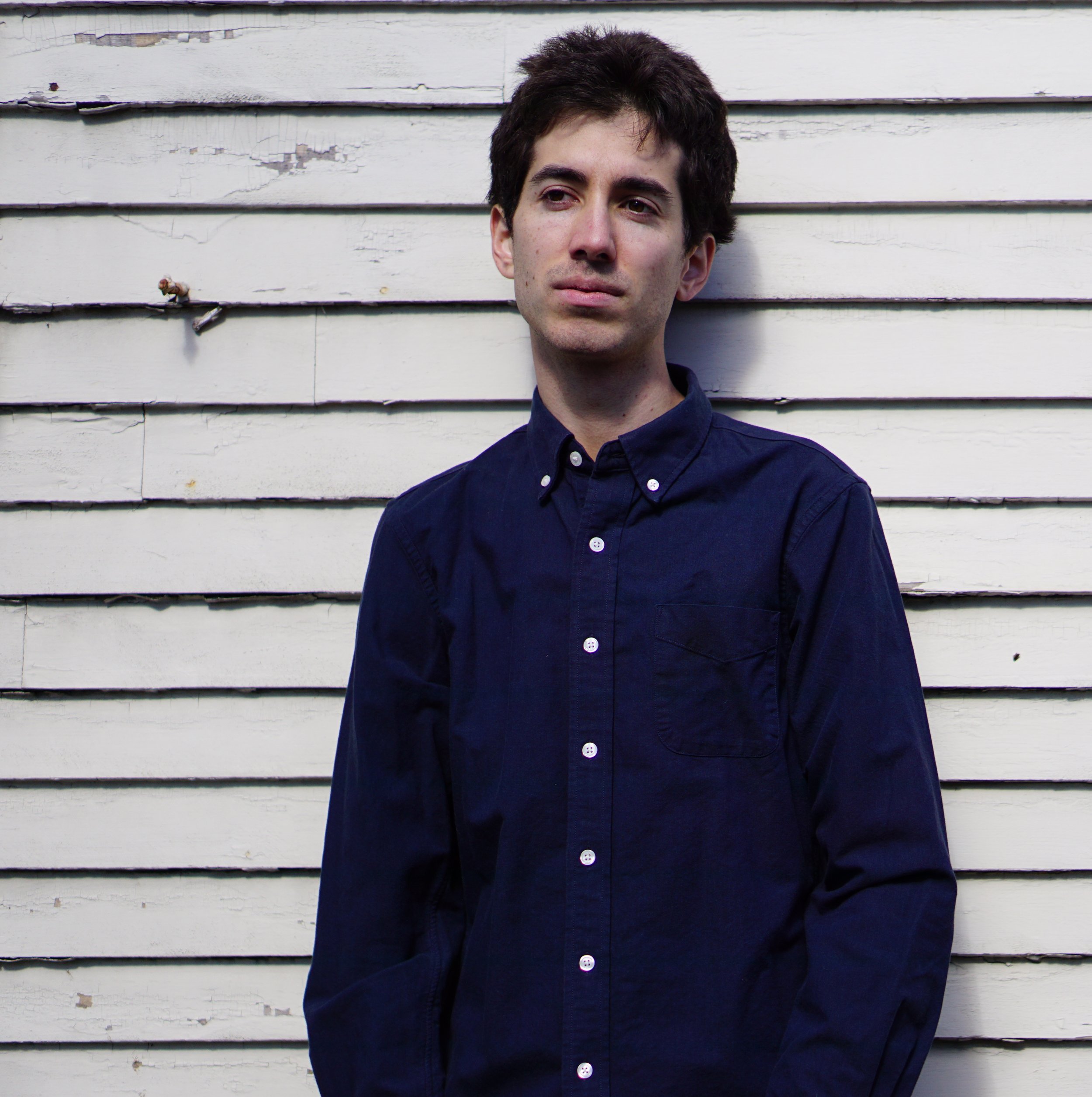phillip golub
filters
catalog: 005
release: 28 october 2022
duration: 33:47
formats: vinyl + digital
vinyl edition: 200
phillip golub, piano
A beautifully meditative and architectural set of loops for solo piano, Filters is the solo debut of pianist and composer Phillip Golub (b. 1993). Approaching the concept of endless repetition through the lens of his delicate & expressive pianism, Golub’s loops unite the austerity of the systems-based with the infinite variety & imagination of live performance.
What does it mean to physically perform something that repeats endlessly? To press down the keys on a piano in the same way, over and over again, rather than to simply offload the process of repetition to a machine? What are the emotional and narrative implications for performer and listener when the musical process must be realized manually — through continuous conscious effort — rather than automatically, through the press of a button?
Filters, the solo debut of pianist and composer Phillip Golub (b. 1993), implicitly poses and answers exactly such questions about the nature of repetition and performance, all through the prism of his lucid pianism.
“Even a listener who doesn't know the technicalities of digital repetition can sense that there's something different about these loops,” he says. “When we know the repetition is not mechanical, there’s a certain feeling of needing to stay very focused with the performer, to be there with them.” The process of manual repetition, then, resembles for Golub a kind of ritual, rather than merely a technological process. It is the act of participation in an entity unfolding over time that interests him.
Golub has been playing the piano since the age of five and composing since his early teens. But it was his decades of experience as a performer, in both the classical and improvised traditions, that gave him the insight — and the confidence — to reduce his compositional material down to its minimum, focusing instead on the act of musical interpretation.
“I started with the first loop as an exercise back in 2018,” he says. “I thought at first that what I had written would be the material for further composition, that I would elaborate the material and make it the basis of more music. But the more I played what I had written, the more I realized: wait, no, this is the piece. Just playing this over and over is the music.”
Golub continued to refine his concept, gradually composing more loops to create an evolving set. He explored different durations and performance contexts, sometimes quietly performing a loop or two as guests arrived to a recital hall, other times programming afternoon-length performances in which each loop extended to durations of 45 minutes or more. He even experimented with orchestrating the loops for various mixed chamber ensembles.
For the recording of his debut solo album, however, Golub wanted to distill the timeless quality of these pieces into a piano-only, LP-length experience. In summer 2019, while in Los Angeles for work on an opera with Wayne Shorter and Esperanza Spalding, he scheduled time to record on a privately owned and beautifully maintained Steinway D.
“I actually performed each loop for 45 minutes or more during the recording sessions. I really wanted to make sure I got a good chunk of time to get really deeply ‘in it.’” Golub then edited together his favorite sections of these extended performances to construct the final album versions.
“Each loop on Filters contains two ‘streams’ of music,” explains Golub. “The outer stream consists of a single high note and a single low note on the piano, always struck together. The inner stream is a succession of simple major or minor triads — with an occasional suspended fourth or added seventh — that continually re-contextualize the color of the pitches of the outer stream. Something mysterious and magical happens here that is unique to the resonance, decay, and overtones on pianos. I think that this blending of the louder outer stream with the quieter and denser inner music is at the core of the effect.”
Structurally, each loop proceeds by ordering two internal sections — A and B — into larger patterns. Some loops have simpler structures, such as AAB, while others are more elaborate. This device serves not only to provide internal repetition within each loop, but also to differentiate each loop’s behavior when subjected to extended repetition, achieving a haiku-like internal balance.
While the harmonic and formal dimensions of Filters are meticulously controlled, some aspects of the compositions are left intentionally open. There is no explicit rhythm specified in the composition, for instance; the approximate timing of each event is indicated with space-time notation. The range of acceptable phrasings — a slightly drawn-out passage here, a minute variation in rhythm there — is something Golub has come to know intuitively. There are also the inevitable, yet tangible, differences in musical surface and micro-acoustic detail that emerge over time, given the physical fact that a pianist interacting with a mechanical instrument is all but incapable of exact repetition.
“The listener may not be able to consciously identify all the subtle differences in the performance on each repetition, but I think the music suggests that you slow down and pay attention to them. You can focus very intently on the rubs between the intervals, the differences in micro-timing or touch across repetitions, the not-always-predictable order of the A's and B's in the forms, and so on. You can have it on to go to sleep, or do your chores, or meditate, or go for a walk. You can listen in the car. You can use the music to calm you and lower your blood pressure. Or you can sit down with the lights off and listen on a hi-fi system in a very focused way. It's all valid.”
Filters is intentionally designed to work in many contexts. Although the structural integrity and endlessly variegated details of these loops reward focused listening, they never demand it. This is also just beautiful music to get lost in.
produced by phillip golub & joseph branciforte
engineered by ryan beveridge
mixed by rasmus zwicki
mastered by joseph branciforte at greyfade studio
vinyl cut by scott hull at masterdisk
liner text by bruce brubaker
album reviews:
POPMATTERS (US): Filters is a triumphant solo debut from Phillip Golub and another fascinating entry in greyfade’s catalog. (read more)
ALLMUSIC (US): 4/5 stars. This is a work that, like the works of the first minimalists, demands a spirit of immersion from the listener, and as with those works, such immersion will be rewarded. (read more)
THE WALL STREET JOURNAL (US): Mr. Golub straddles traditions of jazz and contemporary classical music while aligning with no single school of thought. That search has led to fascinating solo works, including 2022’s Filters, for which he composed, performed, and recorded “loops,” and then edited them into a final piece.
SEQUENZA 21 (US): A cutting edge album that illustrates how the performer can exert the critical creative input from within the confines of a strictly minimalist framework. Phillip Golub has restored creative primacy to the individual musician, even within the heart of a highly process-oriented music. (read more)
POLYPHONIA (PL): A new minimalist treasure. (read more)
PHILIP SHERBURNE (SP): If Satie's Vexations had the tenderness of Mompou's Musica Callada, it might come out sounding something like this. Incredible.
ATTN: (UK): You can hear [Golub] reaching the same gestures again and again, and how he navigates that feeling of familiarity can become quite uncanny. Pauses that expand and contract really feel like they hold the weight of repetition and its effects on the performer. (read more)
NYC JAZZ RECORD (US): The notes paint an alluring swath of microscopic variations across nominal reiterations. The beauty & sincerity of Golub’s execution are what make this album so welcoming. (read more)
CD HOTLIST (US): There’s a sincerity of intent to Golub’s music that makes it inviting rather than confrontational, even as it rewards close attention to its structure. Highly recommended. (read more)
DATAWAVE (US): Beautiful, environmental, meditative and even romantic, but with some underlying tension inside. It's an excellent album for deep listening. At the same time it could be used for recreation, or as a soundtrack for something contemplative. (read more)
LOOP (CL): Golub, whose music has a minimalist & neat character, works on the formation of piano loops, with a sophisticated technique, like a manual repetition that becomes a kind of ritual, rather than a technological process. (read more)
VITAL WEEKLY (NL): Golub is an excellent composer who works in a similar tradition to Erik Satie and Claude Debussy. Simply quiet and beautiful. (read more)
phillip golub
Phillip Golub is a composer and pianist based in New York. His music strides the boundary between the improvised and the notated. His musical practice centers around rethinking the rehearsal process as a site of musical sociality and collective creation. He is also an advocate for independent music artists’ labor rights as a member and organizer for Music Workers Alliance.
He studied composition with Michael Finnissy and Julian Anderson and piano and improvisation with Jason Moran, Bruce Brubaker, Joe Morris, and Ran Blake.
His compositions have been performed at venues such as Merkin Hall (NYC), The Broad Stage (Santa Monica, CA), and on festivals such as Tribeca New Music (NYC), Lake Champlain Chamber Music Festival, and the Hear Now Music Festival (Los Angeles).


